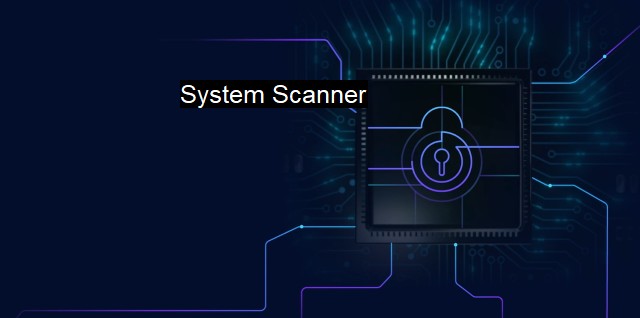What is System Scanner?
Why System Scanners are Essential Components of Antivirus and Cybersecurity Software
A system scanner is an essential tool in the realm of cybersecurity and antivirus protection. This ubiquitous digital entity has a fundamental role in preserving the integrity, confidentiality, and availability of the end-user systems, corporate networks, and stolid data centers that knit together the modern computational world. although its name directly indicates its core functionality, a deeper exploration on what this tool is, the context in which it operates, its purpose, and its associated utilities is necessary for a fully-fledged understanding.Firstly, let's dive into what a system scanner truly is. it is an application designed to carefully sift through a computer system, hunting for any threats such as malware, viruses, or malicious codes lurking in its file system, applications, and network services. Cybersecurity professionals liken it to a detective tirelessly searching for malicious leads in a complex case. The scanner doesn’t rest until every sector of a computer's hard drive, every running process, every registry key, and every last byte of a system's data is thoroughly examined.
The system scanner is steeped in the context of cybersecurity and antivirus applications. Cybersecurity is a sprawling digital field responsible for safeguarding computer systems from data breaches, damage, and service disruption. Its relevance burgeons each passing day due to escalating cyber threats. Thus, cybersecurity encompasses a holistic set of practices, procedures, technologies, rules, and cultures oriented towards preventing unauthorized access to networks, modifying data, or causing Derial of Services (DoS).
Running parallel to cybersecurity, antivirus software forms the first line of defense against malicious programs bent on corrupting or exploiting a system's data, performance, and usability. An efficient antivirus suite is powered by a highly responsive system scanner that can quickly flag suspicious files or behaviors as malicious penetration attempts.
Now that the cybersecurity context has been established, let's discuss the main aim of the system scanner, which is primarily to detect and identify potential risks and threats in the system environment. It does this by using real-time protection features that prevent malicious programs from sneaking into a system undetected. To exemplify, when a user accesses an online asset, the system scanner evaluates this digital property for any abnormalities before allowing access. This provides impregnable protection against harmful websites, phishing attacks, and other digital lechers.
a system scanner can also be retroactive. It uses rapid, deep scans to smoke out latent threats and problems hiding in a system’s nooks and crannies. These introspective hunts target dormant viruses and various forms of malware that lay low, waiting to spring into action when an unsuspecting user unwittingly triggers them.
The utilities associated with the system scanner are many. It can schedule scans, unearthing potential threats at regular intervals, giving an individual system’s user or a network administrator superior control over the safety regimen. Referred to as automated security routines, these periodic sweeps not only save precious time but also lessen the risk of a nasty surprise. some systems scanners provide browser protection, shielding the internet use and download activities.
Lastly, the system scanner proactively aids in patching vulnerabilities. By keeping it updated, one benefits from the most recent threat information and definitions. Frequently updating a system scanner improves its efficiency in combating newer, emerging threats, collectively contributing to the overarching orb of cybersecurity, wiping out dangerous territories one scan at a time.
a system scanner is an irreplaceable tool in the world of cybersecurity and antivirus protection - a consummate investigator, protector, and enforcer. It provides an unblinking vigil over cherished assets, tirelessly ensuring that data integrity remains unviolated. Truly, we may well conclude that it is the unstinting, silent mercenaries of the digital world that is continuously in combat, warding off sinister entities from gates of our systems.

System Scanner FAQs
What is a system scanner?
A system scanner is a cybersecurity tool used to detect and remove viruses or malware from a computer system. It works by scanning the system's files and processes for any suspicious or malicious activity.How often should I run a system scan?
It is recommended to run a system scan at least once a week. However, if you frequently download files from the internet or visit potentially dangerous websites, it is best to run a scan more frequently.Do all antivirus software come with a system scanner?
Yes, system scanning is a standard feature included in most antivirus software. It is essential to ensure that your antivirus software is up-to-date so that it can detect the latest threats.Can a system scanner detect all types of malware?
No, a system scanner may not detect all types of malware. Advanced or sophisticated malware can evade detection by traditional antivirus software. It is essential to keep your system and antivirus software updated and to practice safe internet browsing habits to minimize the risk of malware infections.| | A | | | B | | | C | | | D | | | E | | | F | | | G | | | H | | | I | | | J | | | K | | | L | | | M | |
| | N | | | O | | | P | | | Q | | | R | | | S | | | T | | | U | | | V | | | W | | | X | | | Y | | | Z | |
| | 1 | | | 2 | | | 3 | | | 4 | | | 7 | | | 8 | | |||||||